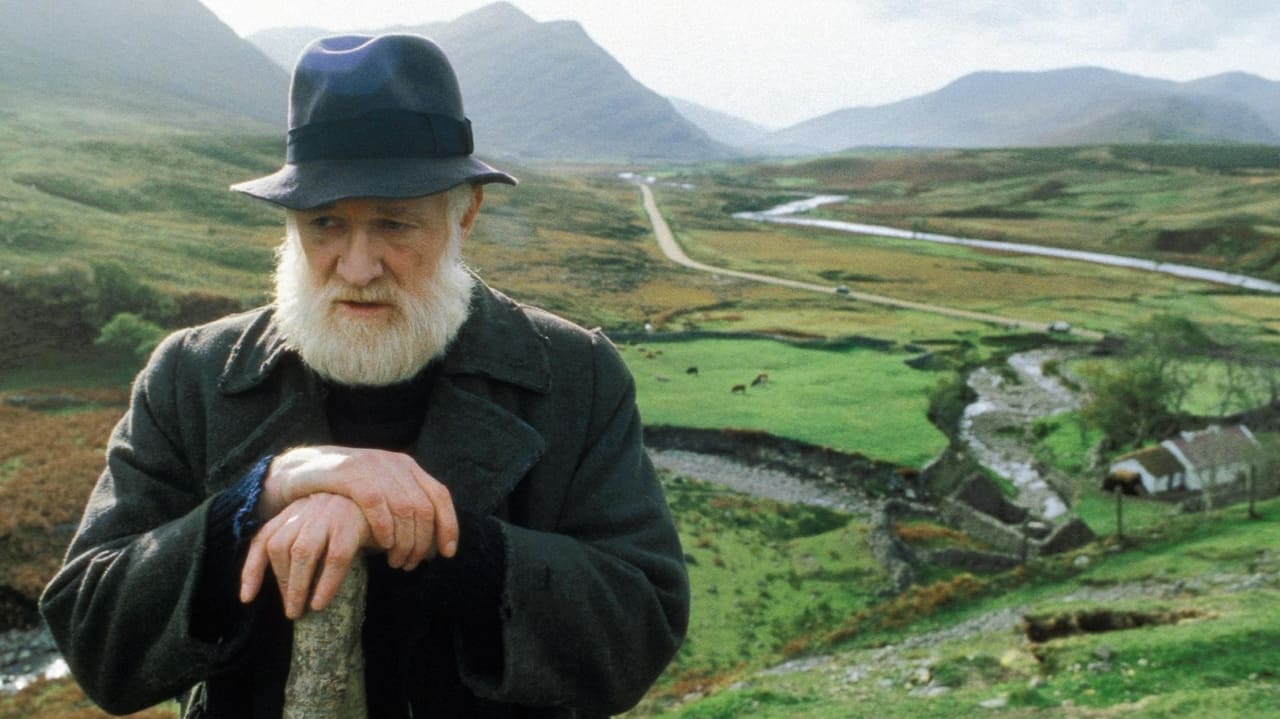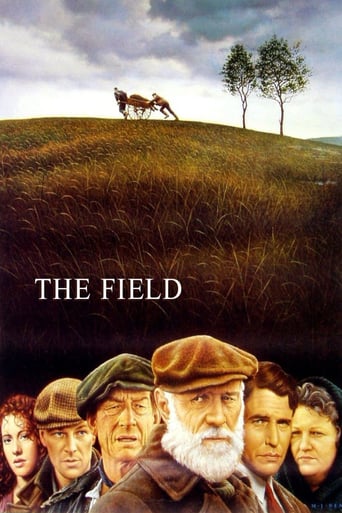

Having just directed "My Left Foot", Jim Sheridan directed "The Field", an adaptation of John B. Keane's 1965 play about a tough farmer trying to hold on to the land that he rents in 1930s Ireland. Richard Harris's Bull McCabe is a real bull in every sense; he's almost not the sort of person who should even have a family. When an American businessman (Tom Berenger) tries to buy the land, Bull takes drastic measures. Much of the story revolves around what we find out about what happened in Bull's family.At times, "The Field" is an unpleasant movie to watch. Of course, that shows what a good movie it is. We see the hardships faced by the Irish (while hearing stories of the Potato Famine) and also get to see some great shots of the Emerald Isle's countryside. This is one movie that I highly recommend.Also starring Sean Bean (Boromir in the "Lord of the Rings" trilogy), John Hurt, Brenda Fricker (Mrs. Brown in "My Left Foot"), Frances Tomelty (Sting's first wife), and brief appearances by Brendan Gleeson and Malachy McCourt (the brother of "Angela's Ashes" author Frank McCourt).
... View MoreWatching this movie, I was put to mind of another film, Mel Brooks' classic "Blazing Saddles." In it, there's a scene where Slim Pickens tells Harvey Korman they should attack a troublesome town by killing the first-born male in every household."Too Jewish," Harvey replies."The Field" is a film that makes me think of that line, only this time the comment is: "Too Irish." "The Field" is a film in love with the earnest desperation of the Irish plight, of wet weather and the shadow of British tyranny, of being trod upon and subjected to every awful thing on God's green earth, to the point where you are numbed into not caring.It helps me not care that the protagonist of the film, one Bull McCabe (Richard Harris), is a rather nasty piece of work who takes out his hard life, and the choices he has made in service to it, on every person around him. Harris was a great actor, and his performance is remarkably poignant given the flimsy material he has to work with. Known for his raging on- and off-screen, Harris sucks you in with McCabe's quiet, sullen magnificence, even when he's just eating sandwiches or hammering a nail. Roger Ebert put it best in his 1990 review: "There is no doubting this is a good performance, but in the service of a hopeless cause."The key problems in this film include a fatally miscast Sean Bean as McCabe's son Tadhg (he's good at projecting hostility, but not of the stupid kind called for here), a pointless central conflict involving an opportunistic American (Tom Berenger, lost with some key lines obviously foleyed in), and a ridiculously ham-fisted conclusion in which Bull finally explodes in unreasoned fury after his criminal activities come a cropper.It's a shame, because the movie has something going for it early on, with Harris's galvanic performance and some killer visuals from cinematographer Jack Conroy that pull grim beauty from the bogs and rocks of this fictional patch of Ireland called Carraigthomond. I'm sure the original stage play by John B Keane had much going for it, as it seems something of a national treasure, but way too much of whatever was good in it is drowned out here in the overwrought acting and grim moodiness of Jim Sheridan's direction.Maybe if McCabe's situation was more sympathetic, the story would have more power. Instead, we are pushed into sharing McCabe's narrow viewpoint until it seems to be telling us the great shame we are witnessing is that Carraigthomond is subject to the same laws of man that shape the rest of the world, and that it would be a finer place if only Yanks, priests, widows, and tinkers weren't allowed to wreck their havoc upon it."There's another law, stronger than the common law," McCabe tells us. "The law of the land."Commenters defending this film seem to be saying this is an Irish thing the rest of the world can't understand, that as McCabe would say, "this is deep, very deep." But it's not, really. A guy wants something he can't have, for whatever reason, and reverts to some sloppy terrorism in his anger.That "The Field" is grim and angry isn't the problem. That it's so grim and angry over something so pointless as three acres of soggy land is.
... View MoreI found this movie riveting up until the last 20 minutes or so. After the priest closes the gates to the church, the rest of it degenerates into a poor attempt at Greek tragedy, with Bull having everything stripped from him. There was no need to destroy the man further after losing Tadgh to the Tinker girl and pushing away his wife's one last attempt at reconciliation. Nothing was gained artistically in my view, and that part of the plot made little sense.For example, the body of the American was picked up from a lake just outside Bull's house (the image of the American hanging from the hook and the echo with Shamey's hanging brilliantly suggests all the guilt Bull must be feeling). Along with the donkey's carcass even if it's not proof Bull did the murder, he should have been held for questioning given everything else. Instead, he is allowed to freely walk around and get himself into further trouble.Little things also got in the way for me. For one, the field was just too small, both to support Bull or to support a mill to grind limestone into roadbed. The herd of Bull's cattle he was driving at the end was just too large for the field to feed, and no single man on foot could have driven them a long distance over rocky ground to the edge of a cliff (not to mention previous scenes had shown the path between the field and the sea did not go through the village). Nobody who had ever grown up around cattle such as Tadgh would ever think to get in front of a stampede, even in grief. It would be like someone who grew up in a city jumping in front of a locomotive running at a high speed to stop someone on the train. It just isn't done unless you are suicidal and I don't think Tadgh was at that point. As someone who is actually familiar with that kind of life, director Sheridan's lack of attention to detail suggests someone who really didn't understand farming or who ultimately only really cared about the psychodrama at the story's center. As a result, he only did an adequate job of fleshing out the play into a movie.Still, the acting was excellent throughout as was Sheridan's direction of the actors. The dark layers underneath Bull's life and family were expertly stripped away as the movie progressed. It was a little like seeing the Irish version of "Long Day's Journey into Night". As someone who grew up on a farm, I understand Bull's love/hate relationship with land that he has worked for decades. It really is like raising another member of the family, and no other movie I can think of has ever shown this better than the moving speech Bull gives at one point (I have to wonder if this speech is a carryover from the original play given Sheridan's missteps in showing farming). And the depiction of the grinding poverty of rural Ireland, the entanglement of ancient wrongs on current family lives, and the ambiguous relationship Bull had with the Church all were in accord with my readings of Irish history (and this is an area in which I'm sure Sheridan and playwright Keane are expert).
... View MoreIt's a small, taut, tragic story of Richard Harris, as Bull McCabe, a sclerotic Irish patriarch who plans on buying at auction the grassy field that he and his family have worked on (and died on) for many years. The land is owned by a widow, however, who has been harassed by Harris and his son, Sean Bean, and is determined to see that the McCabe's don't get it. When a wealthy American (Tom Berenger) shows up, interested in building a cement highway across the field, and harnessing the local waterfalls for hydroelectric power, it certainly looks like McCabe isn't going to get it.Well, McCabe gets it, but not before he accidentally beats Berenger to death and hides the body. It costs him everything he has -- whatever peace of mind he had, his money, his son, his status in the church, his friends, his cattle, and finally his sanity. He who has been virtually running the village, snarling out gruff orders to others, now runs wild, alone, stampeding his cattle over a cliff and onto the rocks below, ranting and screaming like Lear on the moor, driving his son over the cliff as well. After this, still bellowing, McCabe wades out into the sea to his death.Richard Harris does a bang-up, pretty much overwrought job in this role, which was his last. He looks like Michelangelo's sculpture of Pope Julius II, with his remaining gray hair like an unruly coxcomb atop his head and this beard of Biblical proportions. It's the kind of performance that cries out for an Academy Award nomination. Harris got the nomination but didn't win. It was a depressing story about the small-minded people of an Irish village in the 1930s, flailing about in the rain and mud. Not a big star in it. Who needed it? Though, come to think of it, James Coburn won an award for a similar dramatic role after a similar lifetime career playing support or leads in routine movies. Coburn was good in "Affliction" but Harris does a better job with a more complex role here.Well, I wasn't surprised that Harris didn't win, nor did I particularly care. Movies about feuds over a plot of land usually don't win Oscars. Usually the awards go to far better films, films with artistic content that illustrate the human condition, thoughtful and challenging films that carry a great deal of philosophical weight -- "Titanic" and "Pearl Harbor," for instance.If nothing else, "The Field" is a corrective to fairyland presented to us in "The Quiet Man." Having said that, can I still recommend seeing this movie? Not only is Richard Harris great in it, but so is just about everyone else, including John Hurt as a semi-retard, Sean Bean as the sensitive son, Tom Berenger as the not-insensitive rich American, and a host of nameless supporting players.Yes, it is a small movie about a small thing. But small things can carry stones of symbolic weight. A slap in the face is a small thing.
... View More